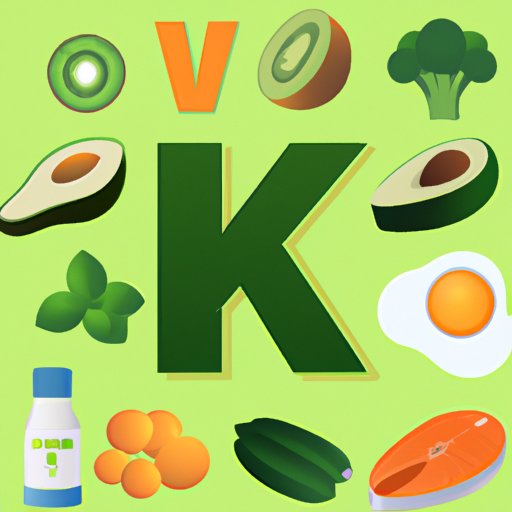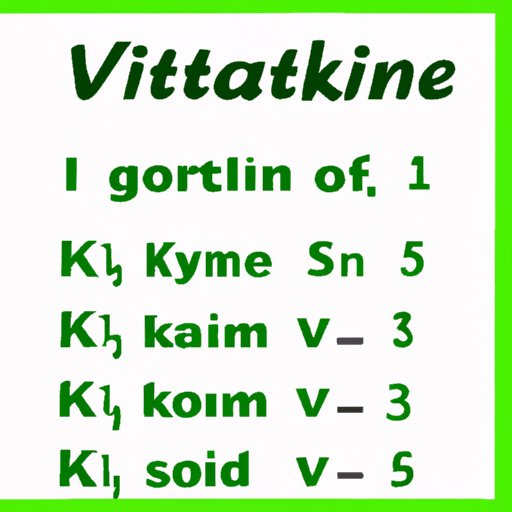
Introduction
Vitamin K is an essential nutrient that plays a crucial role in blood clotting, bone health, and heart health. Despite its importance, many people are not aware of what vitamin K is or how to get enough of it in their diet. This article will provide you with a comprehensive guide on how to get vitamin K, including top vitamin K-rich foods, health benefits, supplements, and recipes.
The Top 10 Foods Rich in Vitamin K
One of the most effective ways to get vitamin K is through your diet. Here are the top 10 foods that are rich in vitamin K:
- Kale
- Spinach
- Cabbage
- Parsley
- Broccoli
- Brussels sprouts
- Swiss chard
- Collard greens
- Turnip greens
- Asparagus
The daily recommended intake of vitamin K varies depending on age and gender. Generally, adult men need about 120 micrograms (mcg) of vitamin K per day, while adult women need around 90 mcg per day. However, pregnant and nursing women may need more.
Consuming vitamin K-rich foods regularly is important for maintaining healthy blood clotting and supporting bone and cardiovascular health.
The Role of Vitamin K in Your Body
Vitamin K is a fat-soluble vitamin that is stored in the liver and fatty tissues. Its main role is in blood clotting by helping to activate proteins in the coagulation cascade. However, vitamin K also has other important functions in your body. There are two types of vitamin K: K1 and K2.
Vitamin K1 is found in plant-based foods and is used mainly for blood clotting. On the other hand, vitamin K2 is produced by bacteria in the gut and is involved in bone mineralization and cardiovascular health.
Vitamin K plays a vital role in bone health by helping to activate osteocalcin, a protein that binds calcium in bones. This means that consuming adequate vitamin K can help prevent osteoporosis and other bone-related conditions.
Vitamin K also helps prevent arterial calcification, a condition where calcium accumulates in artery walls and can lead to heart disease. This is because vitamin K helps activate matrix Gla protein, which helps prevent calcium buildup in arteries.
The Health Benefits of Vitamin K
Consuming enough vitamin K can lead to a range of health benefits beyond just blood clotting and bone health. Here are some of the most significant health benefits of vitamin K:
1. Boosts Bone Strength
As mentioned earlier, vitamin K plays a crucial role in bone mineralization. Studies have shown that consuming more vitamin K can lead to increased bone mineral density and a reduced risk of fractures. This is particularly important for postmenopausal women, who are at increased risk of osteoporosis.
2. Promotes Heart Health
Vitamin K has been shown to help prevent arterial calcification, which is a risk factor for heart disease. Some studies have also suggested that consuming more vitamin K can help lower blood pressure and reduce the risk of stroke.
3. May Help Reduce Cancer Risk
Some research has suggested that consuming more vitamin K may help reduce the risk of certain types of cancer, including lung, prostate, and liver cancer. However, more research is needed to confirm this.
5 Delicious Recipes Packed with Vitamin K
If you’re looking for ways to incorporate more vitamin K into your diet, here are 5 simple yet delicious recipes to try:
1. Kale Salad with Lemon Vinaigrette
Ingredients:
- 1 bunch of kale
- 2 tbsp olive oil
- 1 lemon, juiced
- 1 small garlic clove, minced
- 1/4 tsp salt
Directions:
- Remove the tough stems from the kale and tear the leaves into bite-sized pieces.
- In a small bowl, whisk together the olive oil, lemon juice, garlic, and salt.
- Pour the dressing over the kale and massage it into the leaves with your hands for a few minutes until the kale is wilted and tender.
- Enjoy!
2. Spinach and Feta Stuffed Chicken Breast
Ingredients:
- 4 boneless, skinless chicken breasts
- 4 cups fresh spinach
- 1/2 cup crumbled feta cheese
- 2 cloves garlic, minced
- 1 lemon, juiced
- 2 tbsp olive oil
- Salt and pepper to taste
Directions:
- Preheat your oven to 375°F (190°C).
- Butterfly the chicken breasts and season both sides with salt and pepper.
- In a skillet over medium heat, sauté the spinach with the garlic until wilted.
- Add the feta cheese and stir until melted.
- Divide the spinach and feta mixture evenly among the chicken breasts and fold them closed.
- Place the chicken in a baking dish and drizzle with olive oil and lemon juice.
- Bake for 25-30 minutes, or until the chicken is cooked through.
- Enjoy!
3. Cabbage Soup
Ingredients:
- 1 head of cabbage, chopped
- 2 carrots, chopped
- 2 celery stalks, chopped
- 1 onion, chopped
- 4 cloves garlic, minced
- 8 cups vegetable broth
- 1 can diced tomatoes
- 1 tbsp olive oil
- 2 bay leaves
- 1 tsp dried thyme
- Salt and pepper to taste
Directions:
- In a large pot, heat the olive oil over medium heat.
- Add the onion and sauté for 5 minutes, or until softened.
- Add the garlic and sauté for another minute.
- Add the cabbage, carrots, celery, vegetable broth, diced tomatoes, bay leaves, thyme, salt, and pepper.
- Bring the soup to a boil, then reduce heat and simmer for 30 minutes, or until the vegetables are tender.
- Enjoy!
4. Broccoli and Cheddar Quiche
Ingredients:
- 1 unbaked pie crust
- 4 cups broccoli florets
- 1 cup shredded cheddar cheese
- 4 eggs
- 1 1/2 cups milk
- 1/4 tsp salt
- 1/4 tsp black pepper
Directions:
- Preheat your oven to 375°F (190°C).
- In a pan over medium heat, steam the broccoli for 5-7 minutes, or until tender.
- Sprinkle the cheese over the bottom of the unbaked pie crust.
- Add the broccoli on top of the cheese.
- In a small bowl, whisk together the eggs, milk, salt, and pepper.
- Pour the egg mixture over the broccoli and cheese.
- Bake for 35-40 minutes, or until the center of the quiche is set and the top is golden brown.
- Enjoy!
5. Asparagus Risotto
Ingredients:
- 1 lb asparagus, trimmed and cut into 1-inch pieces
- 1 onion, chopped
- 2 cloves garlic, minced
- 1 1/2 cups Arborio rice
- 1/2 cup white wine
- 4 cups vegetable broth
- 1/2 cup grated parmesan cheese
- 2 tbsp butter
- 2 tbsp olive oil
- Salt and pepper to taste
Directions:
- In a large pot, heat the olive oil over medium heat.
- Add the onion and sauté for 5 minutes, or until softened.
- Add the garlic and sauté for another minute.
- Add the Arborio rice and stir to coat with the oil.
- Add the white wine and stir until most of the liquid has evaporated.
- Add the vegetable broth, 1 cup at a time, stirring continuously until the broth is absorbed and the rice is tender.
- Add the asparagus during the last 5 minutes of cooking.
- Stir in the parmesan cheese and butter.
- Season with salt and pepper to taste.
- Enjoy!
The Best Supplements for Vitamin K Deficiency
Vitamin K deficiency is relatively rare but can occur in individuals with certain medical conditions and those who take medications that interfere with the absorption of vitamin K. Symptoms of vitamin K deficiency include easy bruising, bleeding gums, and excessive bleeding from wounds.
If you are deficient in vitamin K, your doctor may recommend taking vitamin K supplements. The best supplements for vitamin K deficiency include vitamin K1 and vitamin K2. However, it is important to talk to your doctor first before taking any supplements to ensure they are safe for you.

The Surprising Dangers of Vitamin K Overdose
Vitamin K overdose is rare but can occur in individuals who take high doses of vitamin K supplements. Symptoms of vitamin K overdose include redness and itching of the skin, nausea, and stomach cramps.
To avoid vitamin K overdose, it is important to stick to the recommended daily intake of vitamin K and not exceed it. If you are taking vitamin K supplements, make sure to follow the dosage instructions carefully.
How to Incorporate Vitamin K-rich Foods into Your Meal Plan
If you’re not sure how to incorporate vitamin K-rich foods into your diet, here are some tips:
- Add leafy greens like kale or spinach to your salads or smoothies.
- Use cabbage leaves as wraps instead of tortillas or bread.
- Sauté greens like collard greens, Swiss chard, or turnip greens with garlic, olive oil, and lemon juice.
- Make soups or stews using vitamin K-rich vegetables like cabbage, broccoli, or asparagus.
- Snack on raw veggies like broccoli or asparagus spears with dip or hummus.
By incorporating more vitamin K-rich foods into your diet, you can help support your overall health and prevent deficiencies.
Conclusion
Vitamin K is an essential nutrient that is important for blood clotting, bone health, and heart health. Incorporating vitamin K-rich foods into your diet can help you reap the many benefits of this nutrient. In addition, taking vitamin K supplements can be beneficial for individuals who are deficient in this vitamin. Remember to consult your doctor before taking any supplements and to avoid overdosing on vitamin K.




